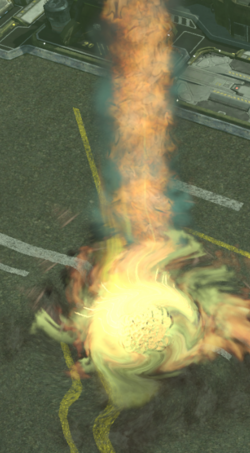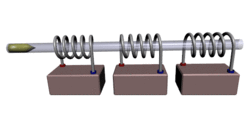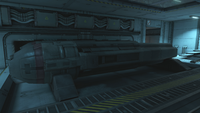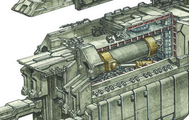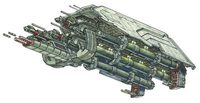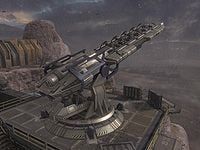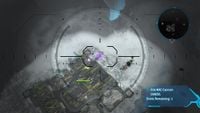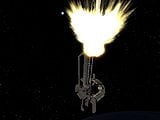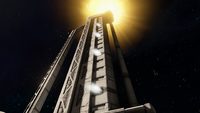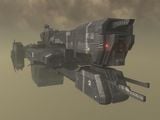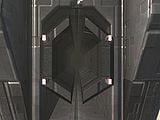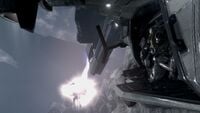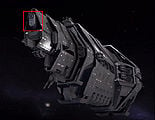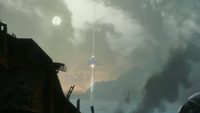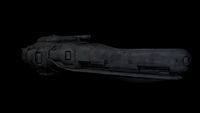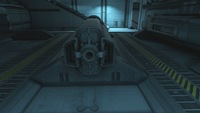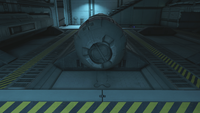Magnetic Accelerator Cannon: Difference between revisions
From Halopedia, the Halo wiki
(The book never mentioned a 600 ton round at supersonic speed, but a asteroid.) |
|||
| Line 71: | Line 71: | ||
===Frigates and destroyers=== | ===Frigates and destroyers=== | ||
[[File:Mac.jpg|250px|thumb|A squadron of UNSC frigates firing their MACs at the ''[[Anodyne Spirit]]''.]] | [[File:Mac.jpg|250px|thumb|A squadron of UNSC frigates firing their MACs at the ''[[Anodyne Spirit]]''.]] | ||
A standard [[UNSC frigate|frigate]]-mounted MAC averages at {{convert|183|m|ft}}.<ref name="visual">'''[[Halo: The Essential Visual Guide]]''', ''page 114''</ref> They can fire a wide variety of rounds depending on the mission type. In 2525, a ''Paris''-class [[UNSC frigate|frigate]]-based MAC was observed firing a heavy ferric tungsten slug at around 30 kilometers per second. | A standard [[UNSC frigate|frigate]]-mounted MAC averages at {{convert|183|m|ft}}.<ref name="visual">'''[[Halo: The Essential Visual Guide]]''', ''page 114''</ref> They can fire a wide variety of rounds depending on the mission type. In 2525, a ''Paris''-class [[UNSC frigate|frigate]]-based MAC was observed firing a heavy ferric tungsten slug at around 30 kilometers per second. in 2552 a Paris-class was know to fire a 600-ton depleted uranium slug. The high muzzle velocity provides the slug the kinetic energy and momentum necessary to damage a target and partially mitigates its unguided nature and its lack of maneuverability.<ref name="fs267">'''Halo: First Strike''', ''page 267'' (2003 edition); ''page ???'' (2010 edition)</ref><ref name="for108">'''Halo: The Fall of Reach''', ''page 108'' (2001 edition); ''page 130'' (2010 edition)</ref> A ''Halberd''-class destroyer's main gun can launch 1170mm slugs at high-velocity speeds.<Ref>'''Halo Mythos''', ''pages 82-83''</ref> | ||
<ref name="High-velocity" group="note">"High-velocity", at least in modern parlance, is a military technical term referring to velocities between 3,000 and 3,500 feet per second (914 - 1,067 m/s) for artillery. See Morris, C. G. (1992), ''[https://www.google.com/books/edition/Academic_Press_Dictionary_of_Science_and/nauWlPTBcjIC?hl=en&gbpv=1&dq=3500+feet+per+second%3B+in+small+arms,+between+3500+and+5000+fps%3B+in+a+tank+cannon,+between+1550+and+3350&pg=PA1027&printsec=frontcover Academic Press dictionary of science and technology]''. Academic Press, p. 1027.</ref> A destroyer or later frigate's MAC has about the same firepower as that of a light cruiser's.<Ref>''[[Halo: Warfleet]]'', p. 36-37</ref> | <ref name="High-velocity" group="note">"High-velocity", at least in modern parlance, is a military technical term referring to velocities between 3,000 and 3,500 feet per second (914 - 1,067 m/s) for artillery. See Morris, C. G. (1992), ''[https://www.google.com/books/edition/Academic_Press_Dictionary_of_Science_and/nauWlPTBcjIC?hl=en&gbpv=1&dq=3500+feet+per+second%3B+in+small+arms,+between+3500+and+5000+fps%3B+in+a+tank+cannon,+between+1550+and+3350&pg=PA1027&printsec=frontcover Academic Press dictionary of science and technology]''. Academic Press, p. 1027.</ref> A destroyer or later frigate's MAC has about the same firepower as that of a light cruiser's.<Ref>''[[Halo: Warfleet]]'', p. 36-37</ref> | ||
Revision as of 19:06, October 19, 2020
The Magnetic Accelerator Cannon (MAC), also known as the Mass Accelerator Cannon,[1][2] is a weapon system employed by the United Nations Space Command on its warships and orbital defense platforms. Essentially large coilguns, MACs serve as the primary armament of UNSC Navy warships and weapon platforms.
Overview
Operational design
The theory behind the operation of a Magnetic Accelerator Cannon is the same as that of a coilgun. The system is a linear motor consisting of a series of magnetic coils which accelerate a metal projectile through a barrel up to high velocity. This technology is not to be confused with that of a railgun, in which a projectile is electromagnetically accelerated between two conducting rails.
Firing operation
The firing process uses electromagnetism to fire a metal slug at high velocity. An extremely large amount of current is put through the first solenoid, (coil of conducting wire), which creates a strong magnetic field that attracts the slug. As the slug passes into the solenoid, the solenoid is quickly turned off and the second solenoid, which is closer to the muzzle, turns on, which attracts the now higher-velocity metal slug just like the first solenoid, and the process is carried on.
A shipboard MAC draws power from the ship's deuterium fusion reactor and requires a charge of the weapon's magnetic coils in order to be fired. The time it takes to bring the MAC's systems to full charge on a UNSC vessel is the deciding factor during in-combat use. Thus, while a vessel may not run out of ammunition for a long time, (depending on the size/weight of the slugs and the capacity of the ship), a commanding officer has to carefully analyze the situation of a battle and use his shots strategically. The weapon could be fired even when not at full charge, but the velocity of the projectile will be greatly diminished.
Orbital defense platforms have the same firing process, though they launch much more massive projectiles with greater frequency. At the moment a slug leaves an ODP-mounted MAC's muzzle, a pair of thrusters on the bottom side of the station fire for a few of seconds to counteract the acceleration imparted to the station.[3]
Ammunition
Magnetic Accelerator Cannons are capable of firing a variety of ammunition types varying on model and bore, ranging from hyper-dense kinetic kill slugs to sub-caliber rounds to semi-autonomous drone missiles [4] to cargo packages and various other special payloads.[5] The largest MACs can even be used to launch small spacecraft.[6] A typical MAC round weighs multiple tons,[7] and is constructed of super-dense ferric-tungsten.[2] The "Super MAC" mounted on one of the Reach orbital defense platforms[8] was capable of firing a 3,000-ton slug at nearly "point four-tenths" the speed of light.[9]
Aiming
The size of a Magnetic Accelerator Cannon is such that it is normally an integral component of a warship's (or station's) structure and cannot be aimed independently; the space vehicle must maneuver to directly face a target. When firing unguided rounds, due to the huge distances involved in inter-ship combat, significant targeting calculations are required to generate a firing solution. These are normally handled by an onboard ship AI if installed.[citation needed] The Mark 2488 Onager, a smaller, turreted MAC, can be aimed and fired by a single operator via a control station attached to the weapon itself.[10] The range of 100km is considered point-blank by the UNSC.
Types
There are numerous variations of the MAC technology, grouped under several "Mark"-based designations. MAC systems are also sometimes roughly divided between "heavy coil" and "light coil" guns.[11][12] All known frigate classes carry one light MAC system, whereas the standard destroyer[13] carry two light MACs and the Marathon-class heavy cruiser carry two heavy MACs.[14] The Navy's post-war flagship, UNSC Infinity, is armed with four "Super MAC" Magnetic Accelerator Cannons, though different from those on Orbital Defense Platforms and of unknown power.[11]
Mark II
The Mark II is a MAC version that uses light coils.
- Mark II, Light Coil - 56A2D4 MAC: The 56A2D4 MAC is a variant that was on the UNSC In Amber Clad, in where it is fitted on the lower boom, with the upper boom having fire control systems and pulsed power storage for the MAC.[15][16] It was also fitted onto the UNSC Pillar of Autumn after it was refitted.[17]
- Mark II, Light Coil - 83B6R3 MAC: The 83B6R3 MAC is a variant that was on the UNSC Forward Unto Dawn.[18]
Mark IV
The Mark IV is a MAC version that uses heavy coils.
- Mark IV, Heavy Coil - 94B1E6 MAC: The 94B1E6 MAC is a variant that was on the Strident-class heavy frigate.[18][19]
Mark V
The Mark V MAC is a MAC version that could be fitted onto orbital stations. The projectiles fired by the Mark V were massive.[20]
- Mark V, 14D4A1 MAC: The 14D4A1 MAC is a variant that is on the Moncton-class orbital weapon platform.[21][22]
Internal workings of the 14D4A1 MAC on Cairo Station.
Mark IX
The Mark IX is a MAC version that uses heavy coils.
- Mark IX, Heavy Coil - 45J3D3 MAC: The 45J3D3 MAC is a variant that was on the Autumn-class heavy cruiser[23]
Series 8
The Series 8 is a MAC version on the UNSC Infinity. Four of these are fitted on the Infinity.
- CR-03 Series 8 MAC: The CR-03 Series 8 MAC, also known as the CR-03S8 MAC,[24] was the first version of MACs installed on the Infinity.
- CR-03B Series 8 MAC: The CR-03B Series 8 MAC was the version put onto the Infinity after it was retrofitted in 2558.[6]
Unknown
The following MAC version currently have an unknown Mark or series.
- Light Coil - 56A2F9 MAC: The 56A2F9 MAC is a rapid fire variant of the Mark II, Light Coil - 56A2D4 MAC. It is fitted on the Epoch-class heavy carrier.[25]
- 14B11R2 MAC Battery: The 14B11R2 MAC Battery is a variant that is a spinal-mounted, twin-linked, 1170mm/647mm high-velocity coilgun. It is fitted on the Halberd-class destroyer.[26]
- 20DA1C2 MAC: The 20DA1C2 MAC is a variant on the Gladius-class heavy corvette.[27]
- 22B6R3 MAC Battery: The 22B6R3 MAC Battery is a variant that is a 530 cm multi-payload coilgun. Three of these are filled on the UNSC Spirit of Fire.[28]
Ship board fitting
Frigates and destroyers
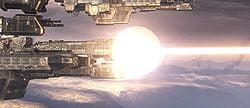
A standard frigate-mounted MAC averages at 183 metres (600 ft).[2] They can fire a wide variety of rounds depending on the mission type. In 2525, a Paris-class frigate-based MAC was observed firing a heavy ferric tungsten slug at around 30 kilometers per second. in 2552 a Paris-class was know to fire a 600-ton depleted uranium slug. The high muzzle velocity provides the slug the kinetic energy and momentum necessary to damage a target and partially mitigates its unguided nature and its lack of maneuverability.[29][30] A Halberd-class destroyer's main gun can launch 1170mm slugs at high-velocity speeds.[31] [note 1] A destroyer or later frigate's MAC has about the same firepower as that of a light cruiser's.[32]
While powerful, these guns require long charge times, impacting their sustained firepower. A destroyer circa 2552 operating at half its usual power output required 50 minutes to charge up its two MACs to 100%, indicating it would normally take 25 minutes to charge both, or 12.5 minutes to charge one.[33]Captain Wallace and Catherine Halsey were able to hold a short conversation complete with emphasizing pauses in the time it took for the UNSC Commonwealth's MAC to charge up an additional 20% (from 30% to 50%).[34] However, the UNSC Majestic was able to fire four MAC rounds after its initial two, at what was implied to be full charge against a few Covenant cruisers, in around ten seconds. Charon-class light frigates were able to fire with only a few seconds of delay between shots during the Battle of Voi, though these shots were fired at an unconfirmed charge level. At the Battle of Sigma Octanus IV, frigates and destroyers were ordered to remain static, which allowed them to funnel all available energy into charging their capacitors. Despite this, it still takes at least thirty seconds for them to charge their MACs to 100%.[35]
It typically only takes one or two fully charged frigate/destroyer MAC rounds to knock out a Covenant vessel's shielding, even those on large ships like cruisers and destroyers.[36][37][38][39] Against a smaller, "frigate-size"[40] ship like the Unrelenting, a single MAC round not only destroys shields, but retains enough energy to devastate the affected area of the hull, crumpling the whole nose.[41] Nearly every Covenant ship can be destroyed with one to three blasts from the standard frigate MAC, allowing UNSC warships to punch well above their weight against the larger and more advanced Covenant vessels.[42] The MAC's power, however, comes at a cost: the large amount of energy needed to fire the weapon is particularly onerous on a warship, and the extended recharge time is a significant factor in combat against Covenant warships. As a result, MAC rounds are often fired at significantly below their maximum potential velocity by an order of magnitude or more. This results in the impacts being much weaker, but the MACs can be fired far faster and such firepower is still sufficient to destroy the shields of most Covenant warships after a few hits.[note 2] The standard Magnetic Accelerator Cannon is sufficient to destroy any human vessel or severely damage an unshielded Covenant vessel.[note 3]
Specialized and modified versions
The standard MAC can be enhanced with booster capacitors which allow the weapon to be fired three times per charge rather than once per charge. This improved technology was only known to be implemented with the UNSC Pillar of Autumn prior to the Fall of Reach.[43] The modified weapon, known as the Mark II, Light Coil - 56A2D4/MAC,[44] charged faster than the standard version, though this is likely due to the Pillar of Autumn's advanced reactors.[43] While much faster than usual, the Pillar of Autumn still suffered from long charge times for its MAC; this could be partially mitigated by putting the totality of the ship's output into charging the weapon, though this was considered a risky tactic, as the engines would have to be powered down and the ship rendered static and vulnerable.[45] Also exclusive to the Pillar of Autumn along with the modified MAC were newer and lighter MAC rounds that had less dense ferrous core, but a harder outer layer of tungsten carbide.[43]
"Super" Magnetic Accelerator Cannon
UNSC orbital defense platforms, Punic-class supercarriers and the UNSC Infinity mount larger and more powerful versions of the standard Magnetic Accelerator Cannon, nicknamed the "Super" MAC or the "big stick". The orbital defense platforms present in orbit of Reach were among the most powerful ever built,[8] approximately 802.2 metres (2,632 ft) long [2] and capable of accelerating 3,000-ton projectiles to "point four-tenths the speed of light", placing it with pinpoint accuracy and impacting with a massive amount of kinetic energy.[9] Most UNSC and Covenant vessels are destroyed by this weapon, with shielded Covenant destroyers being shattered into "a million fragments" upon impact.[46][note 4] The Moncton-class orbital weapons platforms of the Earth's orbital defense grid, on the other hand, were capable of accelerating multi-ton projectiles to muzzle velocities of several kilometers per second via hundreds of asynchronous linear induction motors lining the barrel.[7] However, these guns, even with assistance from the UNSC Home Fleet, were not powerful enough to pierce the shields of the Ur-Didact's flagship, Mantle's Approach. Only the UNSC Infinity's MAC guns managed to pierce Mantle's Approach's hull at a closer range causing considerable damage and even then only after John-117 managed to disable the ship's point-defense guns and shield emitters using an F-41 Broadsword.[47]
By receiving power from ground-based power plants, the orbital defense platforms over Reach could achieve recharge and reload times as short as five seconds.[48] Earth's Moncton-class platforms received power from stacked liquid-metal capacitance cells on the stations themselves.[7]
The first in her own class, UNSC Infinity is equipped with four Super MACs, the CR-03, Series-8 Magnetic Accelerator Cannons.[5][11] In addition to standard MAC rounds, the CR-03S8 is capable of firing various subcaliber rounds, cargo packages, and autonomous kill vehicles with specialized payloads.[5] Two of these nearly 27m-bore coilguns were powerful enough to breach the Mantle's Approach's powerful defenses, allowing the Master Chief to enter the ship. However, the Infinity had to get within relatively close range and needed John-117 to disable some of the Mantle's Approach's point-defense guns to take the shot. Even then, Infinity's shot caused relatively minor damage that was quickly sealed by the powerful Forerunner ship. Notably however, these MAC guns were the only weapons to breach the Didact's ship at all, with even the MAC guns of Earth's orbital defense platforms failing to do any damage.[47]
Small Magnetic Accelerator Cannons
Mini-MAC
- Main article: M510 Mammoth
A UNSC "Mammoth" terrestrial siegework platform mounts a Mark 2457/35cm HRG;[49] a miniature, mobile version of the standard Magnetic Accelerator Cannon, colloquially referred to as a "Mini-MAC".[50] It is designed to destroy terrestrial and suborbital fortifications and warships.[51] G81 Condor Gunships are also equipped with a Mini-MAC, for use against hard targets.[52]
"Onager"
The Mark 2488 Magnetic Accelerator Cannon, informally known as the Onager, is a relatively small Magnetic Accelerator Cannon used for static defense. A manned version was used to defend the Pillar of Autumn on Reach.[10] The Mark 2488 fires a 15 cm round with up to 1.1 gigajoules (0.25 tons) of kinetic energy. It is 32.6 meters long,[53] making a standard frigate-mounted MAC 5.6 times larger by length and roughly 177 times larger by volume, assuming similar dimensions. After the war, a new automated variant, the Mark 2551, was mounted on the UNSC Infinity[54] and Ivanoff Station.[55] The network responsible for the operation of the new model was vulnerable to disruption through the use of jamming devices placed on the Infinity's hull.[54]
Related technologies
M68 Gauss Cannon
- Main article: M68 Gauss Cannon
The M68 Gauss Cannon is a weapon mounted on the M12G1 Light Anti-Armor Vehicle as well as on stationary turrets. It utilizes the same coilgun technology used in MAC, but on a smaller scale.
M92 Principle Gauss Cannon
- Main article: M92 Principle Gauss Cannon
The M92 Principle Gauss Cannon is a weapon system of similar MAC mechanics that runs along the length of the Open Frame 92/Extra-Vehicular Activity.
M99 Stanchion Gauss Rifle
- Main article: Model 99 Special Application Scoped Rifle
The M99 is a man portable anti-matériel and anti-personnel special application weapon using 5.4mm/.21 caliber rounds. Like the M68 Gauss Cannon, it utilizes the same coilgun technology as a MAC, only on an even smaller scale. Though smaller than conventional ammunition, these rounds are accelerated to speeds fast enough to travel long distances with almost no change in trajectory, punch through any obstructing materials, hit their target, and still retain significant kinetic energy.
Mass drivers
- Main article: Mass driver
The mass driver is an orbital launch assembly designed to propel low-weight payloads into orbit, otherwise known as orbital lifting, or to deliver them across a planetary system. The operating principle of the mass driver is essentially the same as that of the Magnetic Accelerator Cannon: it is a large coilgun that magnetically accelerates a package consisting of a magnetizable holder containing a payload.
While not a purpose-built weapon like the Magnetic Accelerator Cannon, these platforms are still potent weapons of opportunity. While never formally incorporated as a weapon, mass drivers have been used at as defensive magnetic accelerator weapons at Harvest, the Rubble, and Reach.
Gameplay
Halo Wars
- "Use the Spirit of Fire's awesome Mass Accelerator Cannon to incinerate enemy troops."
- — In-game description.
In Halo Wars, the MAC Blast ability allows the player to use the UNSC Spirit of Fire's point-defense MACs for pinpoint orbital bombardment. It is mainly used as a support weapon to help the UNSC penetrate heavy Covenant defenses and Covenant bases, and is a potent weapon against Scarabs.
In Skirmish and multiplayer, the MAC Blast can only be used if Captain James Cutter is selected as the player's leader character. In the campaign, the MAC Blast is available in several missions, most notably Dome of Light, during which the player is granted access to forty rapid-fire MAC rounds to destroy a Covenant base that was located under a Covenant energy shield dome until part of the dome was overloaded using Rhinos.
Halo Wars 2
In Halo Wars 2, the MAC Blast has been upgraded by Ellen Anders and Isabel into MAC Blast EMP, which is very effective against all mechanical units. The EMP MAC is only available during the campaign mission "The Cartographer", where it is used to fire on a swarm of Aggressor Sentinels defending a Forerunner conduit. In Multiplayer and Blitz Mode, the MAC Blast is exclusive to Isabel and Sergeant Johnson. Isabel uses standard MAC rounds, while Johnson uses EMP rounds.
Changes from Halo Wars to Halo Wars 2
- MAC rounds can no longer can be upgraded via the Armory.
- Leader Points now can be used to upgrade MAC damage.
Gallery
An orbital defense platform above Reach firing its main cannon.
Nassau Station firing its MAC.
Cairo Station firing its "Super" MAC.
A frontal view of a Charon-class light frigate's MAC.
MAC slugs impacting the Forerunner Dreadnought, to little effect.
The UNSC Grafton firing its MAC at Spire One.
The muzzle of the UNSC Pillar of Autumn's MAC.
The UNSC Infinity fires her forward MAC cannons at the Mantle's Approach.
The effect of a MAC round fired from an orbital defense platform on an SDV-class heavy corvette.
- MAC - Bombardment.jpg
A MAC round impacting the surface of Harvest.
UNSC Commonwealth firing her MAC.
The rear of a slug for Cairo Station's Magnetic Accelerator cannon, seen in Halo 2: Anniversary.
The tip of a slug for Cairo Station's Magnetic Accelerator cannon.
List of appearances
- Halo: The Fall of Reach (First appearance)
- Halo: Combat Evolved
- Halo: The Flood
- Halo: First Strike
- Halo 2
- Halo: Ghosts of Onyx
- Halo: Uprising
- Halo 3
- Halo: Contact Harvest
- Halo: The Cole Protocol
- Halo Legends
- Halo: Evolutions - Essential Tales of the Halo Universe
- Halo: Reach
- Halo: Combat Evolved Anniversary
- Halo: The Thursday War
- Halo 4
- Halo: Escalation
- Halo 2: Anniversary
- Halo: Fleet Battles
- Halo: The Fall of Reach - The Animated Series
- Halo 5: Guardians
- Halo: Shadow of Intent (Mentioned only)
- Halo Mythos
- Halo: Smoke and Shadow (Mentioned only)
- Halo Wars 2
- Halo: Envoy (Mentioned only)
- Halo: Oblivion
Notes
- ^ "High-velocity", at least in modern parlance, is a military technical term referring to velocities between 3,000 and 3,500 feet per second (914 - 1,067 m/s) for artillery. See Morris, C. G. (1992), Academic Press dictionary of science and technology. Academic Press, p. 1027.
- ^ In every single space battle scene in the novels, including Halo: The Fall of Reach and Halo: Ghosts of Onyx, MAC slugs are described as cleanly penetrating from one end of Covenant ships and out the other, as well as punching holes in whatever they hit. This would be impossible if the slugs were actually going at 30 kilometers per second on every occasion, as past around 1.7 km/s, the tungsten slugs would create hypervelocityimpacts. Therefore, the coilguns must be "dialed down", trading pure power and velocity for refire rate (as a point of comparison, a 600 ton object traveling at 1 km/s would impact with the force of 65 tons of TNT). This matches the depiction of MACs in the games, where they have a refire rate of only a few seconds and muzzle velocities of only a few kilometers per second at most (as in the last cutscene of Cairo Station in Halo 2: Anniversary). It also fits the velocity of the MAC slugs in Halo: The Fall of Reach - The Animated Series, and the description of a MAC propelling slugs to supersonic (over 340 m/s) velocities on pg. 264 of Halo: First Strike.
- ^ The Halo Encyclopedia states that a typical shipboard MAC slug is fired at .4c (40% the speed of light), which would probably cause the projectile to be atomized by its own acceleration. The weapon's explosive yield is listed as equivalent to 1.17 teratons of TNT. This would release an average of 21,667 times more energy than Tsar Bomba, the largest nuclear device in history, which is generally agreed to have released between 50 and 58 megatons (210 to 240 petajoules) of TNT-equivalent energy.
- ^ The Halo Encyclopedia claims that a Super MAC slug is fired at .5c (50% the speed of light), and that its explosive yield is around 9.98 teratons. This would result in an explosion with around 184,815 more energy than the aforementioned Tsar Bomba, or roughly one tenth of the energy released by the Chicxulub impactor which wiped out the dinosaurs 65 million years ago.
Sources
- ^ Halo: Contact Harvest, Chapter 7, page 119
- ^ a b c d Halo: The Essential Visual Guide, page 114
- ^ Halo 2, campaign level Cairo Station
- ^ Halo: Warfleet, page 32
- ^ a b c Halo Mythos, page 133
- ^ a b Halo: Warfleet, pages 42-43
- ^ a b c Halo: Warfleet, p.31
- ^ a b Waypoint: Canon Fodder - Lookin Glassed
- ^ a b Halo: The Fall of Reach, Chapter 31
- ^ a b Halo: Reach, campaign level The Pillar of Autumn
- ^ a b c Waypoint: The Halo Bulletin: 10.10.12
- ^ Halo 4: The Essential Visual Guide, page 191
- ^ Halo: The Fall of Reach, page 139
- ^ Halo Encyclopedia, page 251
- ^ Halo Waypoint: UNSC In Amber Clad
- ^ Halo: Warfleet, p. 36-37
- ^ Halo: Warfleet, p. 25
- ^ a b Halo 4: The Essential Visual Guide, page 192
- ^ Halo Waypoint: UNSC Frigate
- ^ Halo: The Fall of Reach, Chapter 24
- ^ Halo: Warfleet, pages 30
- ^ Halo: The Essential Visual Guide, p. 27 (Cairo Station)
- ^ Halo 4: The Essential Visual Guide, p. 191
- ^ Halo Mythos, page 133
- ^ Halo: Warfleet, pages 40
- ^ Halo Mythos, pages 82-83
- ^ Halo: Warfleet, pages 19
- ^ Halo Mythos, page 71
- ^ Halo: First Strike, page 267 (2003 edition); page ??? (2010 edition)
- ^ Halo: The Fall of Reach, page 108 (2001 edition); page 130 (2010 edition)
- ^ Halo Mythos, pages 82-83
- ^ Halo: Warfleet, p. 36-37
- ^ Halo: The Fall of Reach, chapter 21, concerning the UNSC Iroquois: “MAC guns charging,” Lieutenant Hikowa reported. “Sixty-five percent and climbing at two percent per minute.” Later in the same chapter: "He was not about to charge into battle, however, with the Iroquois at half power, her structural integrity already compromised, and with no AI to mount a point defense against Covenant single ships."
- ^ Halo: The Fall of Reach, chapter 12.
- ^ Halo: The Fall of Reach, chapter 21; the retaliatory plasma torpedo salvo occurs an undisclosed time after the first MAC salvo, and it is said it will take 22 seconds to reach the UNSC's line. After it does (destroying the Cradle), another undisclosed amount of time passes as Keyes gives orders and surveys the damage done. Soon after that, Hikowa informs Keyes that the fleet's MACs will be ready to fire in another 3 seconds. Three seconds later, Keyes (and presumably the other captains) give the firing order, and all ships fire together for 63 collective slugs.
- ^ The Fall of Reach, Chapter 21: One undamaged Covenant destroyer turned, however, and left the battlefield. It came about and headed straight for the Iroquois... On the aft screen, the remaining eight UNSC ships broke their attacks and turned toward the incoming destroyer. Three MAC guns fired and impacted on the Covenant vessel. Its shields only lapsed for a split second; it took a round through her nose . . . but it continued toward the Iroquois at flank speed.
- ^ Halo: The Fall of Reach, Chapter 21. Keyes states that the fleet of 45 destroyers/cruisers and 3 other ships will fire their shots in a staggered pattern in order to get three salvos out of one charge for each ship. He also says that the first salvo will deplete the enemy's shields (The fleet’s firing countdowns were roughly timed so that the shots would be staggered into two, maybe three, massive salvos. The first salvo would—hopefully—knock out the Covenant ships’ shields. The final salvo was to be the knockout punch.). The same scene specifies that all the UNSC ships together fire 63 MAC rounds (The Iroquois shuddered as the MAC gun fired. On the status display, Keyes watched as the rest of the UNSC fleet fired simultaneously. A twenty-one-gun salute three times over for those on board the station who had given their lives.). Sixty-three divided by two or three salvos equates to 21 to 31 shots per salvo, against a force of 20 Covenant ships, and thus one or two shots per ship. Keyes is proven correct in his assumptions, as the first salvo is said to have knocked out the shielding of "most" of the ships by the time the second salvo connects (A handful of the shots were clean misses. Keyes winced; each one of the off-trajectory MAC rounds meant one more enemy ship would survive to return fire. The vast majority, however, slammed into the unshielded alien vessels.).
- ^ Halo: Ghosts of Onyx, concerning the Onyx Conflict: Seven MAC rounds struck the two lead destroyers in the Covenant line, shattered their shields, dented the armor, and pounded through hulls, crippling the vessels so they aborted their attack run as they were caught in the planet's gravity pull. One ship's engines flared, overloading as its captain attempted a survivable landing. Seven rounds divided by two destroyers indicates that one destroyer took a maximum of three or fewer rounds, meaning a maximum of two to destroy its shielding alone.
- ^ Halo: Reach, Reflection radio conversation: UNSC Majestic destroys three cruisers with six shots.
- ^ Halo: Silent Storm
- ^ Halo: The Fall of Reach, Chapter 12 - "The lights on the bridge dimmed and the Commonwealth shuddered. The MAC bolt launched through space— a red-hot metal slug moving at thirty thousand meters per second. The Covenant ship’s engines flared to life and the ship veered away— —Too late. The heavy round closed and slammed into the target’s prow. The Covenant ship reeled backward through space. Its energy shields shimmered and glowed lightning bright . . . then flickered, dimmed, and went out. The bridge crew let out a victory cheer. Except Dr. Halsey. John watched the view screen as she adjusted the camera controls and zoomed in on the Covenant ship. The vessel’s erratic spinning slowed and it came to a stop. The ship’s nose was crumpled and atmosphere vented into vacuum. Tiny fires flickered inside. The ship slowly came about and started back toward them—gaining speed.
- ^ Halo Encyclopedia, p. 330: "Able to pulverize most Covenant ships in one to three blasts, these weapons are mounted on all UNSC spaceships large enough to hold them. Unfortunately, MACs are slow to fire and, due to their size, require the entire ship on which they are built to maneuver in order to align fire."
- ^ a b c Halo: The Fall of Reach, page 275
- ^ Halo Waypoint: Pillar of Autumn
- ^ Halo: The Fall of Reach, chapter 36: “Sir,” Lieutenant Hikowa cried. “We have an insufficient charge rate to fire the MAC guns.” “Understood,” Captain Keyes said. “Divert all power from the engines to regenerate gun capacitors.” “May I point out—” Cortana said and crossed her arms “—that if you power down the engines, we will be inside the blast radius of the Shiva warhead when it reaches the Covenant ship?” “Noted,” Captain Keyes said. “Do it.”
- ^ Halo: The Fall of Reach, page 297 (2001 edition)
- ^ a b Halo 4, campaign level Midnight
- ^ Halo: The Fall of Reach, Chapter 33
- ^ Halo 4: The Essential Visual Guide, page 115
- ^ Halo 4, campaign level Reclaimer
- ^ Halo 4 Interactive Guide
- ^ Halo Waypoint - Canon Fodder: The Art of War(s)
- ^ Halo 4: The Essential Visual Guide, page 75
- ^ a b Halo 4, campaign level Infinity
- ^ Halo 4, campaign level Composer
